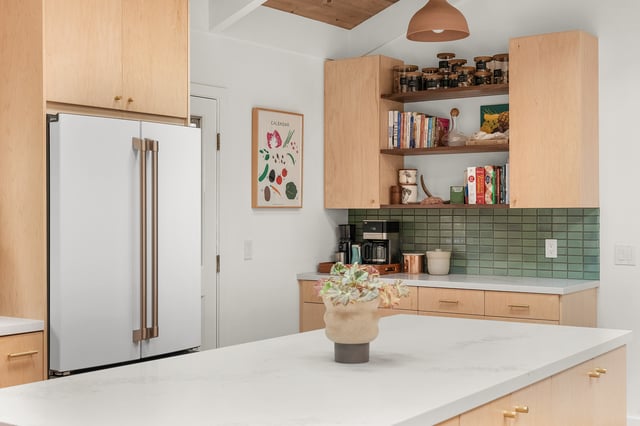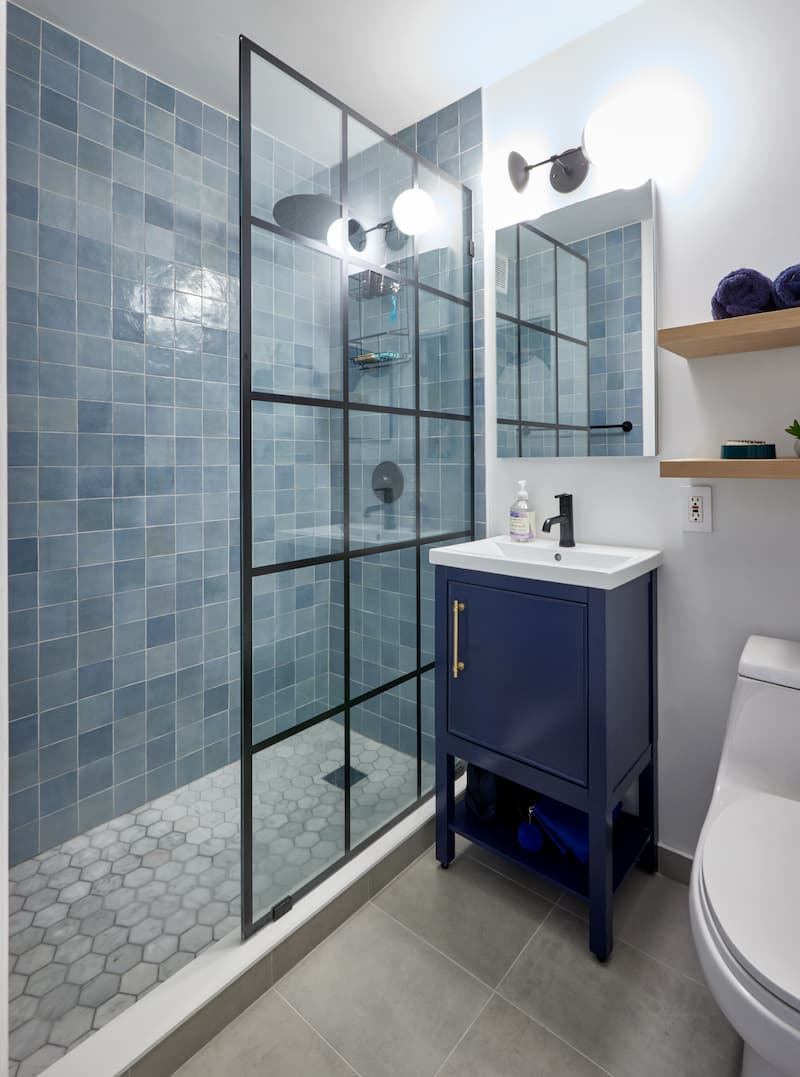How to Choose a Kitchen Remodel Contractor

In This Article
Choosing the right contractor for your kitchen remodel is crucial to the success of the project. The kitchen is one of the most important rooms in your home, often serving as the center of family life and entertainment. Whether you're planning a complete overhaul or just a few upgrades, hiring a skilled and reliable contractor will help bring your vision to life while avoiding costly mistakes. This guide covers everything you need to know about selecting the right kitchen remodel contractor, including key factors to consider, red flags to avoid, and essential questions to ask.
Learn More: How Much Does it Cost to Remodel Your Kitchen in 2025?
Why Hire a Professional Kitchen Remodel Contractor?
Kitchen remodels are complex projects that require expertise in various trades, including carpentry, plumbing, electrical work, and design. While some homeowners may consider DIY approaches, professional contractors bring several advantages, such as:
- Experience and Skill: Contractors have extensive knowledge of building codes, materials, and techniques to ensure quality and compliance.
- Project Management: Coordinating multiple trades and schedules can be overwhelming. A contractor handles this, ensuring tasks are completed on time.
- Time and Cost Savings: Professionals can minimize costly errors and delays, often securing better prices on materials through their industry connections.

Factors to Consider When Choosing a Kitchen Remodel Contractor
- Experience and Specialization
Not all contractors specialize in kitchen remodels. Look for those with a proven track record in kitchen renovation projects. Experienced contractors understand the unique challenges of kitchen layouts, plumbing, and cabinetry installation. Ask for portfolios of previous projects and references from past clients. - Licensing and Insurance
Verify that the contractor holds the appropriate licenses for your state and carries adequate insurance, including liability and workers' compensation coverage. This protects you from legal and financial risks if accidents occur during the project. - Reputation and Reviews
Research online reviews and ratings on platforms like Google, Yelp, and the Better Business Bureau (BBB). You can also ask for referrals from friends, family, or neighbors who have recently remodeled their kitchens. Positive feedback from multiple sources is a strong indicator of a trustworthy contractor. - Clear Communication
A successful remodel relies heavily on effective communication. Your contractor should listen to your needs, offer constructive suggestions, and keep you informed throughout the project. Pay attention to how responsive and transparent they are during the initial consultation. - Detailed Written Estimates
Request itemized quotes from multiple contractors to compare costs. The estimate should include a breakdown of labor, materials, and other expenses. Be wary of unusually low bids, which may indicate the use of substandard materials or shortcuts.
Learn More: How to Choose a General Contractor
Steps to Hiring the Right Contractor
- Create a Shortlist
Begin by researching contractors in your area and compiling a shortlist based on their experience, reviews, and recommendations. Consider contractors who have completed projects similar in scope and style to your desired remodel. - Interview Potential Contractors
Schedule consultations with at least three contractors. Use this opportunity to discuss your vision, budget, and timeline. Ask about their experience with kitchen remodels and how they handle challenges, such as unexpected structural issues. - Ask the Right Questions
The following questions can help you assess a contractor’s qualifications and compatibility with your project:- How many kitchen remodels have you completed?
- Are you licensed and insured?
- Can you provide a list of references?
- What is your typical project timeline?
- How do you handle changes to the project scope or budget?
- Do you work with subcontractors, and if so, how are they vetted?
- Check References
Contact previous clients to learn about their experience working with the contractor. Ask about the quality of work, adherence to the timeline, and how well the contractor communicated throughout the project. - Review the Contract
Once you’ve selected a contractor, review the contract carefully. It should include details on project scope, payment terms, warranties, and a timeline for completion. Avoid signing contracts that leave room for ambiguity or omit important details.
Red Flags to Watch For
-
Lack of Proper Licensing or Insurance
Avoid contractors who cannot provide proof of licensing and insurance. Working with unlicensed contractors exposes you to significant risks, including liability for workplace accidents and non-compliance with building codes. -
High-Pressure Sales Tactics
Be cautious of contractors who push you to sign a contract quickly or pressure you into making hasty decisions. Reputable professionals allow you time to review your options and ask questions. -
Unrealistically Low Bids
While it’s natural to want to save money, bids that are significantly lower than others may indicate poor workmanship or hidden costs. Ensure that all estimates cover the same scope of work for a fair comparison. - Lack of Written Documentation
Never agree to verbal contracts or vague proposals. A legitimate contractor provides clear, written agreements that outline every aspect of the project, including change order policies.
Maximizing Value During Your Kitchen Remodel
To get the most out of your investment, collaborate closely with your contractor to prioritize features that enhance both functionality and aesthetics. Consider the following upgrades:
- Energy-Efficient Appliances: Modern appliances can reduce energy costs and improve performance.
- Quality Cabinets and Countertops: Durable materials like quartz and hardwood increase the longevity and appeal of your kitchen.
- Smart Storage Solutions: Custom cabinetry, pull-out shelves, and lazy Susans optimize space and convenience.
- Lighting Design: Layered lighting, including task, ambient, and accent lighting, creates a well-balanced and inviting atmosphere.
Additionally, establish a contingency fund to cover unexpected expenses, which are common in remodeling projects.
Learn More: How to Plan Your Renovation Budget
Managing the Remodeling Process
- Set Realistic Expectations
Understand that delays and unforeseen challenges are part of the remodeling process. Flexibility and open communication with your contractor can help mitigate frustrations. - Stay Involved
Regularly check in with your contractor to monitor progress and address any concerns. Being proactive can prevent small issues from escalating into major problems. - Maintain a Project Journal
Keep a record of important decisions, changes to the plan, and communications with your contractor. This can serve as a valuable reference if disputes arise.
After the Remodel: Final Inspections and Follow-Up
Once construction is complete, walk through the kitchen with your contractor to ensure everything meets your expectations. Create a punch list of any remaining tasks or touch-ups that need to be addressed. Verify that all appliances, fixtures, and systems are functioning correctly.
Reputable contractors often offer warranties on their work. Familiarize yourself with the warranty terms and keep all relevant documents in a safe place for future reference.
Conclusion
Choosing the right kitchen remodel contractor can make the difference between a smooth, successful project and a stressful, costly ordeal. By thoroughly vetting candidates, asking the right questions, and staying engaged throughout the process, you can ensure your kitchen remodel meets your needs and enhances your home’s value. Take your time to research, plan, and communicate clearly with your contractor, and you’ll be well on your way to creating the kitchen of your dreams. If you’re ready to start your renovation journey, Block is here to connect you with the best contractors in the business. Get started today.
Frequently Asked Questions
What should I prioritize when hiring a kitchen remodel contractor?
How do I check a contractor’s credentials?
Why are detailed estimates important?
How can I avoid being overcharged during a kitchen remodel?
How long does a kitchen remodel typically take?

Renovate confidently with Block
Easily compare quotes from top quality contractors, and get peace of mind with warranty & price protections.
Thousands of homeowners have renovated with Block

4.5 Stars (100+)

4.7 Stars (100+)

4.5 Stars (75+)
Renovate confidently
- Top quality contractors
- Warranty & price protections
- Expert resources



